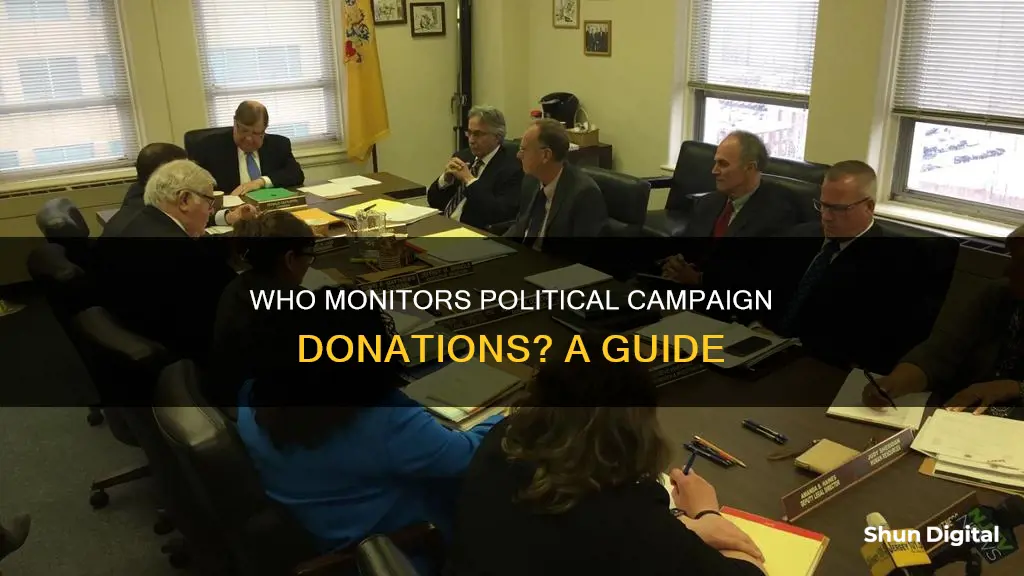
Political campaign donations are monitored by the Federal Election Commission (FEC) in the United States. The FEC is an independent regulatory agency established by Congress in 1975 to administer and enforce the Federal Election Campaign Act (FECA). The FEC maintains a database of individuals who have made contributions to federally registered political committees, including information such as the occupation or employer, the amount contributed, and the name of the committee disclosing the contribution. In addition to the FEC, there are several other organizations that track and provide information on political campaign donations, such as OpenSecrets, a nonpartisan independent nonprofit organization, and MapLight.org, a nonpartisan research organization. These organizations aim to increase transparency and accountability in politics by providing the public with data and analysis on the flow of money in American politics.
| Characteristics | Values |
|---|---|
| Name of Agency | Federal Election Commission (FEC) |
| Type of Agency | Independent Regulatory Agency |
| Year Established | 1975 |
| Purpose | Administer and enforce the Federal Election Campaign Act (FECA) |
| Data Maintained | Database of individuals who have made contributions to federally registered political committees |
| Data Search Functionality | Search by individual contributor name, employer, occupation, location, contribution date, amount, receiving committee |
| Data Availability | Downloadable bulk data |
| Website | www.fec.gov |
What You'll Learn

The Federal Election Commission (FEC)
The FEC's duties include monitoring and enforcing donation prohibitions and limits on campaign contributions. It also oversees public funding for presidential campaigns. The Commission maintains a database of individuals who have made contributions to federally registered political committees, including details such as the contributor's occupation or employer, the amount contributed, and the committee that disclosed the contribution.
The FEC website provides a portal where users can search the contributions database, review FEC filings, and download data. The Commission encourages individuals to consult the Federal Election Campaign Act of 1971, as well as its amendments, regulations, advisory opinions, and applicable court decisions for further information.
The FEC is an independent agency, ensuring non-partisan oversight of campaign finance in federal elections.
Rick Ross' Ankle Monitor: A Legal Conundrum
You may want to see also

OpenSecrets.org
History
Funding
OpenSecrets is funded entirely by donations from individuals and grants from private foundations. Since 2020, its largest donors have included the Carnegie Corporation of New York, Democracy Fund, the Hewlett Foundation, Google, and the Rockefeller Brothers Fund. The organization reported $6.5 million in revenue in 2021 and has approximately 7.5-9 million annual website visitors.
Features
The website offers a wide range of features and tools to help users understand the role of money in politics. Users can search for political contributions by candidates, organizations, industries, and donors. It also provides expenditure profiles for organizations that have made federal election campaign contributions since 1989. Additionally, OpenSecrets offers lobbying databases that allow users to search by company, lobbying firm, lobbyist, industry, or issue. The site also includes congressional committee profiles, presidential administration data, and judicial officeholder donation information.
Blind Spot Monitoring: Is It Available on the Nissan Kicks?
You may want to see also

Political Action Committees (PACs)
Political Action Committees, or PACs, are groups that raise and spend money to elect or defeat political candidates. PACs have been part of the US political landscape since 1944, when the Congress of Industrial Organizations formed the first PAC to raise money for President Franklin D. Roosevelt's reelection campaign.
PACs are typically associated with businesses, labor unions, or ideological interests. For example, the Microsoft PAC and the Teamsters PAC represent corporate and labor union interests, respectively, while EMILY's List PAC and the National Rifle Association PAC promote specific ideological agendas. PACs solicit funds from their members or employees and donate to candidates and political parties. Individual contributors to PACs can also donate directly to candidates and parties, even if the PAC has already supported them.
PACs are subject to regulations and must register with the Federal Election Commission (FEC) within 10 days of their formation. They have specific donation limits, with a maximum of $5,000 per election to a candidate committee and $5,000 annually to another PAC. They can, however, give up to $15,000 per year to any national party committee.
There are different types of PACs, including separate segregated funds (SSFs), nonconnected committees, Super PACs, and Hybrid PACs. SSFs are established by corporations, unions, or membership organizations and can only receive contributions from individuals associated with the sponsoring entity. In contrast, nonconnected committees are not affiliated with any specific organization and can solicit funds from the general public. Super PACs and Hybrid PACs can receive unlimited contributions from various entities, but they are intended solely for independent expenditures and political activities without donating directly to candidates.
The role of PACs in political financing is significant, and they are a key aspect of campaign finance in the United States.
Monitoring Data Usage: Arris Router Guide
You may want to see also

Lobbying and its influence
Lobbying is a legally registered form of public campaigning undertaken by individuals or organisations to pressure governments into specific public policy actions. It is an inherent part of a constitutional republic, and in the United States, it is protected by the First Amendment and the Lobbying Disclosure Act of 1995. Lobbying is not the same as bribery, as it does not ask for special treatment but is instead a way to influence legislative action that affects all citizens. Lobbying is an important lever for a productive government, providing access to government legislators and acting as an educational tool. Lobbyists represent the interests of citizens who do not have the opportunity or access to represent themselves to the government.
In the first quarter of 2015, the top 10 lobbying groups in Washington spent a combined total of more than $64 million on influencing federal policy. Lobbying expenditures can be found on websites such as OpenSecrets.org, which offers searchable databases of lobbying activity by clients, firms, industries, or issues. OpenSecrets.org also provides campaign expenditure profiles for more than 20,000 organisations that have made federal election campaign contributions since 1989. The Sunlight Foundation, a nonpartisan nonprofit that advocates for open government, also provides information on campaign and political spending by lobbyists.
The total dollars spent in 2014 on lobbying interests totalled over $3.2 billion, and the number of lobbyists employed reached almost 12,000. This number has only increased in subsequent years, with lobbyists in 2015 already registering $0.8 billion in lobbying spending by the middle of the year.
Destroying LCD Monitors: A Step-by-Step Guide
You may want to see also

Campaign finance laws
The FEC also oversees public funding for presidential elections and tracks campaign finance data. Candidates are required to disclose the names of individuals and organizations contributing to their campaigns, as well as how they spend the money they receive. This information is made available to the public through the FEC's database.
In addition to the FEC, other organizations also play a role in monitoring and providing transparency around campaign finance. These include nonpartisan groups like OpenSecrets (a merger of the National Institute on Money in Politics and the Center for Responsive Politics), which tracks money in U.S. politics and its effect on elections and public policy; MapLight.org, which compiles data on the sources of campaign contributions; and the Sunlight Foundation, which advocates for open government and uses technology to hold government accountable.
These laws and organizations aim to ensure transparency and accountability in the campaign finance process, allowing the public to understand the sources and usage of funding in political campaigns.
Performing Freely: Unmonitored, Unrestrained, Unbound
You may want to see also
Frequently asked questions
The Federal Election Commission (FEC) monitors political campaign donations.
OpenSecrets is a nonpartisan, independent, nonprofit organisation. It is the nation's premier research group tracking money in U.S. politics and its effect on elections and public policy.
Nearly all OpenSecrets' data originates from an official government source. Congressional and presidential campaign finance data comes from the FEC. Lobbying data comes from the Senate Office of Public Records. State-level campaign finance data comes from state agencies across the U.S.
On the OpenSecrets website, you can search for donors to politicians, explore lobbying data, and find out which industries and organisations are supporting elected representatives.
The Federal Election Campaign Act (FECA) is the statute that governs the financing of federal elections. It is enforced by the FEC.







